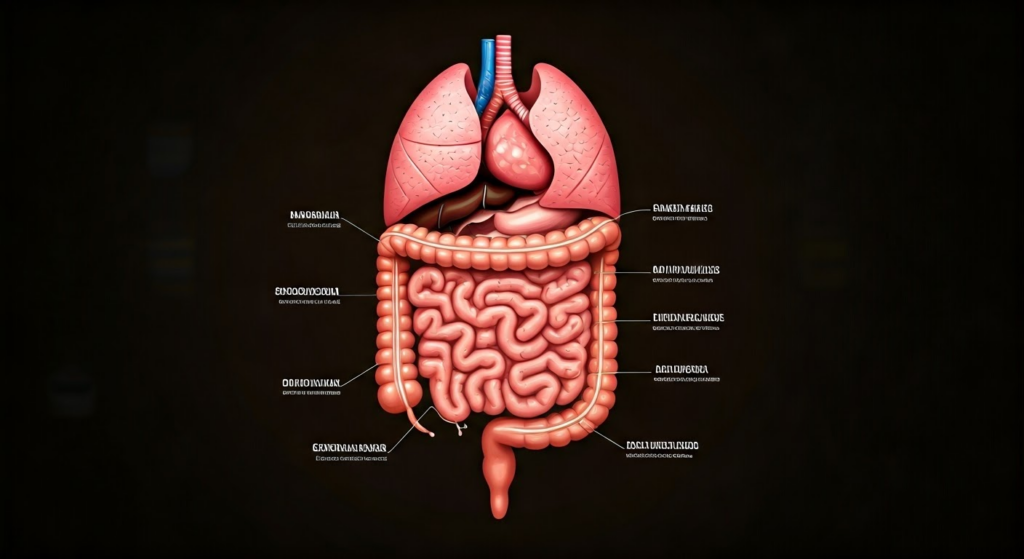Understanding Digestive System Drugs: A Comprehensive Guide

Key Highlights
- Digestive system drugs encompass a wide range of medications that target various gastrointestinal disorders.
- These medications work through different mechanisms, such as reducing stomach acid, promoting motility, or reducing inflammation.
- Understanding the types of digestive system drugs and their uses is crucial for effective treatment.
- Long-term use of certain digestive drugs may carry potential risks and require careful monitoring.
- It is essential to consult a healthcare professional for diagnosis and guidance on the appropriate medication.
Introduction
Digestive system drugs are important for treating different problems in the gastrointestinal tract. They can help with issues like heartburn and irritable bowel syndrome. These medications can provide relief and support for your digestive health. However, self-treating can be dangerous. It’s important to talk to a healthcare provider for a proper diagnosis and treatment. They will look at your symptoms and find the best action plan for your needs.
Overview of Digestive System Drugs

The human digestive system is a group of organs that work together. Their job is to break down food, absorb nutrients, and get rid of waste. When something goes wrong in this system, we often need digestive system drugs.
These medications cover many types of treatments that focus on different parts of digestion. For example, antacids help to reduce stomach acid. Other drugs help control how your intestines move. It is advisable to take these medications with a full glass of milk or water for better efficacy. Digestive system drugs work to bring things back to normal and reduce pain or discomfort.
The Role of Medications in Digestive Health
Maintaining a healthy GI tract is very important for your overall health. Medications help a lot in keeping this balance. When your digestive system has problems, it can cause really uncomfortable symptoms, including irritation of the esophagus.
In such cases, medications work to fix these issues. For instance, too much acid can hurt the stomach lining and cause ulcers or gastritis. Medications can reduce acid production, which helps the stomach lining to heal.
They can also help with other problems in the GI tract, like constipation and inflammation. By focusing on specific issues, these medications can provide relief and support the healing process.
Types of Digestive System Drugs
The world of digestive system drugs is large. Many types of medications focus on different parts of digestive health, including NSAID-associated treatments. Some of the most commonly prescribed are antacids, H2 blockers, and proton pump inhibitors.
Antacids help by neutralizing stomach acid. They give quick help for heartburn and indigestion. H2 blockers lower the amount of stomach acid made. They are often used for ulcers and GERD.
Proton pump inhibitors are the strongest type of medication to reduce acid. They work well by blocking stomach acid production and help treat many acid-related problems.
Common Digestive Disorders and Their Treatments
Digestive problems are a common health issue for many people. The digestive system helps break down food and take in nutrients, while also ensuring the efficient passage of food. Sometimes, people deal with problems like heartburn or more serious, ongoing issues.
To treat these problems, a variety of methods are used. This includes changing habits, adjusting diets, and taking medicine. Medicine is very important for controlling symptoms, helping the healing process, and making life better.
Acid Reflux and GERD: Medications and Management
Gastroesophageal reflux disease, or GERD, is a long-term issue that affects many people. It happens when stomach acid backs up into the esophagus often, which can increase the severity of reflux. This can lead to heartburn, regurgitation, and chest pain. To manage GERD, people often need to change their lifestyle and take medication.
Medications for GERD mostly aim to lower or neutralize stomach acid. Antacids are great for quick relief because they help to neutralize the acid in the stomach. H2 blockers and proton pump inhibitors work differently. They help to reduce how much stomach acid is made and can also be effective for treating stomach ulcers.
Lifestyle changes are also important in managing GERD. These changes include avoiding certain foods that trigger symptoms, eating smaller meals, keeping a healthy weight, and stopping smoking.
IBS and IBD: Understanding the Medication Options
Irritable bowel syndrome (IBS) and inflammatory bowel disease (IBD) both affect the large intestine and are influenced by intestinal bacteria. They have some similar symptoms. This includes abdominal pain, diarrhea, and constipation. However, the causes and treatments for these two disorders are different.
IBS is a functional disorder. This means there are no clear signs of damage in the digestive tract. The main goal of IBS treatment is to manage symptoms and improve life quality. People with IBS may use different medications to enhance stool consistency. These can include antidiarrheals, laxatives, antispasmodics, and antidepressants, based on their symptoms.
IBD is different. It causes ongoing inflammation in the digestive tract. The aim of IBD treatment is to lessen inflammation, control symptoms, and avoid complications. Medications for IBD may include aminosalicylates, corticosteroids, immunomodulators, and biologics.
In-depth Analysis of Key Digestive Medications
Understanding how important digestive medications work is very important for both doctors and patients. Knowing this helps everyone make better choices about treatment options.
Let’s look at some common digestive medications. We will explore how they work and what possible side effects they might have.
Proton Pump Inhibitors: Mechanism and Uses
Proton pump inhibitors, or PPIs, are strong medicines that help lower stomach acid, aiding in the healing of ulcers. They do this by blocking the proton pump, which is an important enzyme that releases acid into the stomach. Because of this specific action, PPIs work well for many problems related to acid.
One main reason people use PPIs is to help heal duodenal ulcers and ulcers in the stomach. By cutting down the amount of acid, PPIs help create the right environment for ulcers to heal.
PPIs are also very good at managing GERD symptoms, like heartburn, regurgitation, and chest pain. By controlling acid production, they stop acid reflux and protect the esophagus from harm.
Antacids and Their Role in Managing Stomach Acid
Antacids are a common over-the-counter remedy for heartburn, indigestion, and other symptoms of excess stomach acid. These medications work by neutralizing the acid already present in the stomach, providing quick relief from discomfort.
Antacids typically contain one or more of the following active ingredients: aluminum hydroxide, magnesium hydroxide, calcium carbonate, and sodium bicarbonate. Each ingredient has its own unique properties and potential side effects.
| Antacid Ingredient | Action | Potential Side Effects |
| Aluminum Hydroxide | Neutralizes acid | Constipation |
| Magnesium Hydroxide | Neutralizes acid | Diarrhea |
| Calcium Carbonate | Neutralizes acid | Constipation, gas, bloating |
| Sodium Bicarbonate | Neutralizes acid | Gas, bloating, electrolyte imbalance |
The Impact of Long-Term Usage of Digestive Drugs

Digestive drugs can help with many stomach problems. However, using them for a long time might cause some side effects and health risks.
That’s why it’s important to use these medications carefully and follow advice from a healthcare provider. Keep track of how you’re doing and learn about any possible side effects. This will help you manage your digestive health safely and effectively over time.
Potential Side Effects and Risks
Digestive drugs, like any medicine, can cause harmful side effects. Not all people will have these effects. The side effects can vary based on the drug and how each person reacts. Some common side effects are constipation, diarrhea, headaches, and nausea.
For example, aluminum hydroxide, found in many antacids, can cause constipation, especially if taken for a long time. In contrast, magnesium hydroxide, another ingredient in antacids, can act like a laxative and might affect the fluid content of the colon, potentially causing diarrhea.
It’s important to know about these side effects and talk to your healthcare provider about them. They can help you consider the benefits and risks of taking these medications over time and may adjust your treatment plan if necessary.
Monitoring and Managing Long-Term Therapy
Monitoring and managing long-term treatment with digestive drugs is very important. It helps ensure safety and effectiveness. Regular visits to your healthcare provider help them check how you are responding to the treatment. They can also spot any possible side effects and change your medication if needed, especially if you’re taking the medication with a glass of liquid.
Older adults and people with health issues, like heart failure or kidney disease, may need more careful monitoring. This is because they are at a higher risk of problems. It is very important to talk with your healthcare provider about any changes in your health or how you use your medicine.
Keep in mind that managing digestive disorders over a long time needs teamwork between you and your healthcare provider. By working together, you can improve your digestive health while reducing possible risks.
Conclusion
Understanding drugs for the digestive system is important for keeping your stomach healthy. These sure medicines help with issues like acid reflux and IBS. They are important for managing different digestive problems. But you should know about the side effects and risks if you use them for a long time. It is crucial to watch and manage your treatment. This helps ensure you stay healthy. By knowing the types of digestive drugs and their effects, you can choose wisely for your health. Always talk to healthcare professionals for personal advice on how to manage your digestive issues well.
Frequently Asked Questions
What is the best medication for severe acid reflux?
Choosing the right medication for serious acid reflux depends on how bad your symptoms are and other personal factors. Antacids, including tablet forms, and H2 blockers can help a little, but proton pump inhibitors usually work better for severe cases. It is important to talk to your healthcare provider for the right diagnosis and treatment advice.
Can long-term use of digestive drugs lead to dependency?
Most digestive drugs are safe to use for a long time, especially when a healthcare provider guides you. However, some medications may raise worries about dependency. It’s important to talk to your doctor about these concerns and make sure you get the right monitoring.
How do probiotics fit into digestive health management?
Probiotics are good bacteria. They help keep the digestive system balanced. They do this by adding back the normal bacteria in the GI tract. Probiotics can also help reduce issues like bloating, gas, and diarrhea. This helps improve overall digestive health.
Are there natural alternatives to conventional digestive medications?
Yes, there are many natural options to help with digestion. Changing your diet to include more foods with fiber can help a lot. Also, managing stress and exercising regularly can be good for your digestive health. Plus, herbs like ginger and peppermint can ease some digestive problems.
What should I do if I experience side effects from a digestive drug?
If you have side effects from a digestive drug or a new medicine, you should reach out to your healthcare provider quickly. They can check the situation and give advice on how to manage the side effects. They might also change your medication if needed to keep you safe and healthy.
https://www.nlm.nih.gov/medlineplus/druginfo/meds/a601230.html
https://www.bjc.org/For-Patients-Visitors/MyChart
https://www.bjc.org/bjc-healthcare-connect-recognition
https://doctors.bjc.org/wlp2/altonmemorialhospital/doctors/appointment////1

